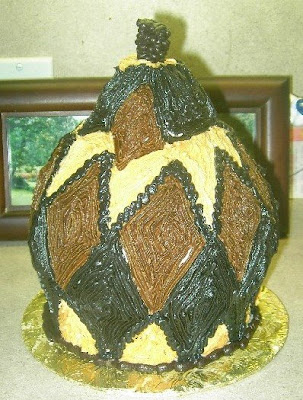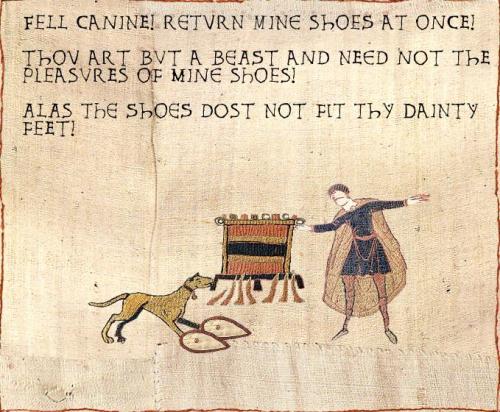Tuesday, October 13, 2009
Sunday, October 11, 2009
ick, thanks my school

because someone questioned the security of my gender/sexuality at my school
and i promptly filled out a butthurt report form


Tuesday, October 6, 2009
Now you're the one cracking jokes. He isn't quoting from the NRSV./ > check KJV/ That's better.
"> read publisher
Smart move! PUBLISHERS who brought out religious fiction among their offerings often carved out their own little theological fiefdoms. For example, a NOVEL published by CHARLES DOLMAN, BURNS AND OATES, or R. WASHBOURNE will undoubtedly be ROMAN CATHOLIC. Remember to look up PATRICK SCOTT's important article on this subject, as well as the more recent study by MICHAEL LEDGER-LOMAS.
This NOVEL was published by an EVANGELICAL PUBLISHER.
> read date
The novel appeared in 1852.
> does that mean something?
Well, y-e-s-s-s-s-s.
> google date
Lots of stuff happened in 1852. Were you interested in Parliamentary debates, or maybe contemporary theater?
> help
Doesn't anybody read HISTORY these days? Walk across the room and find DENIS PAZ or JOHN WOLFFE.
> oh
Oh, indeed. This novel appeared during one of the most aggressively ANTI-CATHOLIC decades of the VICTORIAN ERA, just two years after the so-called PAPAL AGGRESSION.
Did I mention that your CLERGYMAN wrote CONTROVERSIAL TRACTS?
> look up tracts in worldcat
There are copies in the British Library and the Bodleian.
> look up tracts in googlebooks
Hey, look, a TRACT.
> bookmark
Done.
> can i read the $*@#! book now?
Be my guest. But it looks like your CLERGYMAN's TRACT was written in response to another tract.
> sigh
You can look it up later."

Sunday, September 27, 2009
"surveillance"
 It's the Panopticon! As the "Blog" of "Unnecessary" Quotation Marks notes, does the implied surveillance cause self-disciplining in this parking lot?
It's the Panopticon! As the "Blog" of "Unnecessary" Quotation Marks notes, does the implied surveillance cause self-disciplining in this parking lot?Friday, September 25, 2009
prospectus
In mid-nineteenth century America, among the most popular works of fiction were novels like Maria Cummins’s The Lamplighter that depicted the of an ambiguously raced and classed orphaned girl into a properly Christian white middle class woman. Critics such as Nathanial Hawthorne, James Joyce, and A. W. Abbot wrote off these novels (particularly The Lamplighter) as utterly unimportant to literary history in part due to the sheer volume of tears present in the pages. But what do these tears really mean? The function of the motif of tears in Cummins’s The Lamplighter reveals the complicated nature of sexuality for women in 19th century America. Beneath the flood runs a deeper connotation of sexual desire between women, and the intense paroxysms of tears become moments of sexual release for Gertrude and Emily as they negotiate their life together. Sobbing marks their relationship from the first time they meet and allows the two of them to become physically close. Tears fall to Gerty’s cheeks at moments of intense desire, ultimate confession, and at separation and redefinition of relationships.
I believe that these tears indicate two somewhat opposing things: first, fissures in the performance of heterosexuality as well as true womanhood; second, a purification of Gerty herself, punctuating her path from orphan to the ideal woman. These converse meanings intertwine constantly, complicating a reading that goes one way or the other. While it is subversive to value relationships with women over those with men, a necessary prerequisite for this romantic friendship is stability of identity—only white middle class women get to play the romantic friendship game in the 19th century, and as other literature attests, interracial relationships between women or relationships between women who are on different class levels generally end in strict discipline. Only if Gerty is the ideal woman can she and Emily embark in their queer desire for one another.
Current scholarship on The Lamplighter tends to focus on the seditious ways that gender is undermined throughout the text. Critics like Nina Baym and Jane Tompkins often discuss how these novels were received in their time period and how they related to a female audience. Marianne Noble looks at The Lamplighter through a gothic lens and notes that sentimental fiction in general relies on the gothic to produce sexual tension. Her work centers on sadomasochism in sentimental literature, which will be very useful for my paper. The most recent work around my primary text moves away from discussing these novels as allegory for the oppression of women and moves toward a more complicated understanding of how these texts enforce and break down gender binaries. I hope that my paper will provide a fresh critical take on tears that does not just reduce them to a signpost for the exertion of gender norms.
I will first examine how as a child Gerty marked many adults as her parent, and how this reveals the mutability of her relationships within the text. Crying and sobbing play a key role in Gerty’s ability to manipulate adults into parent relationships with her, and the tears in this section of the book seem to come primarily from anger and rebellion rather than an attempt at empathy. Examining Gerty’s childhood also highlights the beginning of her relationship with Emily and reveal what Emily must change about Gerty for the two of them to begin a romantic friendship. The second section will focus on Emily and Gerty’s adult relationship and how crying spells bring them together, with particular focus on their intersectional identities and how they help and hinder their relationship. I wish to conclude with a rereading of the ending of The Lamplighter, one that challenges the notion that the “happy ending” is marriage, when Emily discusses her deep sense of loss of Gerty after her marriage of Willie. Gerty curiously denies the women in her life tears when she marries Willie. Gertrude reserves tears only for her relationships with women—Willie can never privy to the close relationship that Gertrude has with Emily, and thus cannot experience Gertrude’s tears in a way that brings them closer together.
Saturday, September 12, 2009
Today's Library Acquisitions
- Hawthorne by Henry James
- Sensational Designs: The Cultural Work of American Fiction, 1790-1860 by Jane Tompkins
- Woman's Fiction: A Guide to Novels By and About Women in America, 1820-1870 by Nina Baym (whom I have the biggest crush on)
- The Masochistic Pleasure of Sentimental Literature by Marianne Nobel
- Intimate Matters: A History of Sexuality in America by John D'Emilio and Estelle B. Freedman
- Harry Potter and the Deathly Gallows. Necessary for decompression.
Friday, September 11, 2009
Wednesday, September 9, 2009
The Postmodern Pear and other neat things

Tuesday, September 1, 2009
I'm Somewhat Back
- CHAUCER EXTRAVAGANZA
- The Lamplighter Redux
- Hawthorne, James, Cather, Chesnutt, and Wharton
- Some more feminist theory...

They're from AshiDashi.

Wednesday, August 5, 2009
beans and a break
In other news, I'm going to take a short break from this blog. It's the end of the summer and I need a few days to get it all together before I go back to school. I appreciate those of you who have started reading regularly and I hope to have some more meaty (or tempeh-y) posts when I get back to school and start Foucaulting full time again.
Also I'm going to write a short series about biking while trans. And I need those to marinate for awhile.

Thursday, July 30, 2009
Tattooed Ladies of the TLA


Man, I want to get a tattoo at a library conference.
Also, isn't this quilt beautiful? I think I will make it--it is relatively easy.

From here.

This Morning

Via loltheorists.
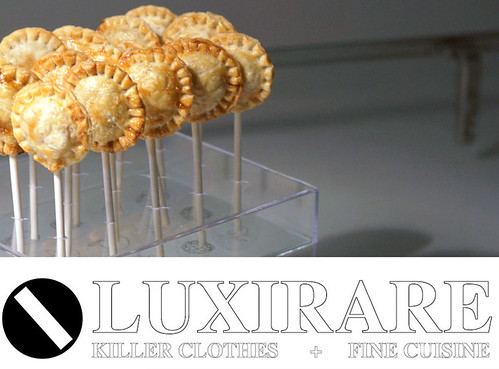
Pie lollipops from Luxirare!!
Also, The Guardian ran an article about books about biking/cycling.

Wednesday, July 29, 2009
Below the Belt Raises the Question: Will you be a good parent?
"Raising children in this world is a battle when you start to see things from this angle. Most parents don’t realize what they’re in for until they have a gender-variant kid, because they effectively are pointed at and called on by parents, teachers, and the rest to provide an answer about how they feel about their kid’s actions on a daily basis: Oh, are you sending him to soccer practice with my boys? Does your daughter want to come over and play house with my girls? Look at him playing with all those girls – he’s going to be a heartbreaker!"Go read the rest.

Tuesday, July 28, 2009
Saturday, July 25, 2009
Friday, July 24, 2009
TINY HORSE ALERT
I can't get pictures in right now, so make sure to go look, you'll be glad you did.

The Day after Theory Thursday Links and Opinions
- The British Government released new tips for pregnant women to avoid H1N1 flu. Considering that I've been watching The Tudors on Netflix the past few days, H1N1 flu seems to be the new sweating sickness.
- Questioning Transphobia reports about the Leticia King pre-trial hearings.
- NPR has an interesting article up about the underground movement for women pastors in the Southern Baptist church. A bit from it:
Like the Church of Christ that I grew up in, Southern Baptist churches are very critical of women being pastors. In the Church of Christ, women are not allowed to serve the Lord's Supper, pray in front of adult men without their permission or during any large assembly, or even lead singing. Not that you can conflate the two denominations, but they have very similar principles."Burleson says Jesus treated women as equals, and if Southern Baptists ignore his example, the denomination will shrivel. Burleson believes there's a quiet underground movement within the convention to rethink women's roles."
- Here's a round up of posts about Henry Louis Gates Jr.'s arrest. I want to add that Henry Louis Gates has been doing tireless work to bring American Black women writers into a very white scene. My thesis is on American women writers in the 19th century, Maria Susanna Cummins in particular, and without Henry Louis Gates we wouldn't have The Bondwoman's Narrative or Harriet Wilson's work--and she wrote the first African-American novel. To me he is an extremely important man without whom the field that I might enter would be even more blank--read "white" and "male." Obama comments on Gates's Arrest. BoingBoing's reporting on the ordeal. Jack and Jill Politics Link Round-Up. There is of course a ton more interesting reading out there than this.
- And now for another round-up--this time on Harry Potter! I haven't seen the movie yet, but soon I will contribute my 8.00 to the millions they have already made. There is some great stuff out there about the movies and a few about the books, including: Less about Harry Potter and more about YA Lit--Racialicious had a great post awhile ago about "Writing what you know" and what that means in the extremely white world of YA literature. RaceWire Goes to the Movies: Harry Potter Edition. And the amazing Anusuya Sivaram's Racial Justice Guide to Viewing Harry Potter and the Half-Blood Prince. Read the whole thing, but here are her bulleted points:
"Themes of Racial Justice that appear in the 6th book specifically (and will hopefully come up in the movie):
-The portrayal of terrorists/criminals. In the magical world of J.K. Rowling, Death Eaters, who are predominantly “purebloods” use terror tactics, as opposed to the pluralistic “Order of the Phoenix”, who don’t. In contrast, our mainstream media gives more airtime to terrorists and criminals who are people of color, rather than white domestic terrorists/criminals. It’s an interesting reversal that perhaps needs to be contextualized more, given the allegory. It’s also an interesting historical shift as well.-Structural racism. The Ministry of Magic’s regulations on magical species (Centaurs, House-Elves, etc) that prevent them from using magic is analogous to structural racism in our Muggle World. Though this only plays a small role in Book Six, it’s interesting to see the reversal that takes place—from campaigning against the societal position of House Elves and other magical creatures, Harry and his friends start rely on these creatures (Dobby, Kreacher, Firenze), and seem to espouse their subordination as long as they are treated benevolently.
-Merit based achievement vs. Favoritism. This is especially important with the arrival of Professor Slughorn (the formation of the “Slug Club”, which rewards the privileged). Also the fact that Muggle-borns often have to work harder for everything than purebloods (Hermione Granger, though brilliant, simply doesn’t command universal respect like I think she should.), should be of some interest to us. This is also relevant under structural racism, as minorities (Muggle-born wizards) don’t have well-established avenues to recourse in the magical world (there’s limited infrastructure for Muggle-borns being introduced to the Magical world for the first time), and must rely on the benevolence of wizards. Harry’s status is also questioned—he’s just lucky, not talented, but reaps the benefits of his position, intentionally or not.
-The origins of racism/discrimination. Tom Riddle (Lord Voldemort) and his origins are a major plotline in the novel. Rowling's theory of discrimination mainly discusses individual racism, while structural racism is what ARC concentrates on eliminating. Also, Rowling emphasizes love as a way to combat intolerance (Dumbledore says this is the reason why Harry isn't like Voldemort)--you can interpret this to mean pluralism is better than purity. Still, it’s important to recognize that while Rowling’s magical world is amazing (who DIDN’T want to go to Hogwarts when they read the books?), it’s still stratified, and faces the same problems of equity and pluralism that our world does."
Of course, I am concerned that Rowling decided to couch her racial arguments in magical allegory rather than actually having more than just token characters of color.
And finally--Cake Wrecks on Harry Potter!
Sunday, July 19, 2009
Tip: Don't Invade Gay Bars on the Anniversary of Stonewall
Saturday, July 18, 2009
Thursday, July 16, 2009
Thursday Theory: The Jumbled Up Edition

Oh, Marlene...
- Dorothy Surrenders featured Marlene Dietrich, whom I love, for Gender Fuck Thursday today.
- Kristine at Serendipities noted that the BBC's In Our Time recently did a segment on revenge tragedies. 'Tis Pity She's a Whore by John Ford should be required reading, in my opinion.
- According to the Library Journal, Ohio libraries will lose 30% of the state's support.
 Boing Boing notes that Senator Sessions is quite racist. Senator Jeff Sessions once said before the Senate Judiciary Committee: "I may have said something about the NAACP being un-American or communist, but I meant no harm by it." Contrast that with his I-think-identity-politics-suck bullshit opening statement.
Boing Boing notes that Senator Sessions is quite racist. Senator Jeff Sessions once said before the Senate Judiciary Committee: "I may have said something about the NAACP being un-American or communist, but I meant no harm by it." Contrast that with his I-think-identity-politics-suck bullshit opening statement.- Shakesville has a Sotomayor round-up and open thread.
- Very necessary for theories of all kinds--Cuisinart releases a home 2-quart ice cream maker.
- Apparently there is a 3-foot spitting earthworm on the prowl.
Wednesday, July 15, 2009
Dear American Library Association
Seriously folks? Not the best move.
Library Journal reports here and here.
Tuesday, July 14, 2009
Sotomayor, Cats, and Stuff

I love Sonia Sotomayor!
image via Shakesville and Associated Press

From Cute Overload: “Noah is a non-releasable, one-legged homing pigeon/rock dove that is in the rehab center. Noah kept going over to the bunny cage and looking in—even sleeping in front of the door to the cage.”

Idea Kitteh, ICHC

Oh, Judy B. Via Loltheorists. As my friend so brilliantly said, "LOLTHUSSER."
Some Quotes about the Word Cisgender
Monica over at TransGriot noted that: "Cisgender is a neutral term that doesn't have the negative accumulated baggage of being used to 'other' or used as a rallying cry by the Forces of Intolerance to oppress someone's human rights rights like trans has.
There are no people being made the butt of societal jokes because they are cisgender. There's no 'cisgender panic defense'. There's no one being denied a job because they are cisgender. There's no one being killed because of folks hating on you for being cisgender. There's no Cisgender Day Of Remembrance."
Lisa over at Questioning Transphobia brought up that: "Cis is not targeted at gay white men, nor is it targeted at feminist women, nor is it targeted at any one particular demographic. Cis people are everywhere. At the most liberal interpretation (highest number of trans people, plus genderqueer and intersex people) I’m aware of, cis people make up ~480-495 out of every 500 people on Earth.
Some things that they both brought up, as well as some of my own thoughts, that I think are very very important points in this discussion:
- Trans people came up with cis, and cis folks are uncomfortable with that because they don't like being labeled. I'd like to add that not being labeled is a privilege all its own, and the ability to choose to not accept a label is symptomatic of that privilege.
- This really boils down to people not wanting to own up, in my opinion--not wanting to own up both to their cis privilege and to their transphobia.
- Can someone please talk about how messed up the concept of "trans privilege" is in this context? Though maybe trans folks should get together and talk about what it could be in our community, too.
Saturday, July 11, 2009
another social construction example
Why is this a good example? Well,
1) There is absolutely no good reason for women’s shirts to button differently from men.
2) The reasoning behind it, though slightly unknown and undecided, is typically believed to come from men using weapons more often than women. And men being “the hunter” and “defender” is not biologically determined but a construction on its own.
3) It has been used by sexologists and other theorists of the past to justify sexist thinking.
Tuesday, June 30, 2009
Thursday Theory is Tuesday Theory this week

I shot the Serif, link here.

via Tom Gauld

Proud to be an "American," over at the "Blog" of "Unnecessary" Quotation Marks
I have familial obligations this Thursday, so here we go a little sooner!
- Tamara Nopper wrote over at Everyday Sociology about the Black/Non-Black divide that happens on Top Chef. Essentially, the (overwhelming number of) white chefs on the show are never asked to cook "their culture," Black chefs are physically absent from the show, and the Asian chefs are expected to "have soul" and Tom Colicchio expects to see something of the chef's racial identity in their cooking. I think that this still plays out in Top Chef Masters. I just watched the last one with Rick Bayless, and as much as I like Rick Bayless it's kind of creepy and racist that he can be an "expert" on Mexican street food and other regional cooking in Mexico as a white man who lived there for about ten years and then come home and turn that into his fancy restaurant in Chicago. Oh, and add the racist dynamic of the last episode that "ew, let's get Americans to eat OFFAL, which no sane person would touch." Something else I don't like about Top Chef AND Top Chef Masters is that anyone who speaks a non-American or non-British English is immediately subtitled.
- Whoa, the folks over at Serious Eats found out about this hotel room covered in SWISS CHEESE.
- Hooray--amandaw will be back at Feministe this summer.
- I am currently making some Oven-Roasted Tomato Jam.
- Ireland is federally recognizing civil partnership rights.
- For all of you college/graduate students who have trouble with your deadline, corrupted-files.com can send you a corrupted word file that you can pass along to your professor, buying you a few more hours on your thesis. They're usually 5.95 but they're on sale for 3.95 until the end of June.
- Derrida would be proud: Ben and Jerry's has deconstructed the sundae.
- Hopefully, Lenovo will introduce the death knell of the Caps Lock key...
- I forgot to link the discussion over at Questioning Transphobia in yesterday's post about cis being an inflammatory word, which to me on the part of folks calling for cis to be eradicated is still the most stultifying conversation ever held on the internet.
Monday, June 29, 2009
Re: Cis as an Inflammatory Term
Here is the argument I see most often leveled against it, with my corresponding this-is-why-your-logic-doesn't-work responses:
"I didn't choose to be called cis. I don't like it. You don't like 'tranny,' and I don't call you that, so don't call me cis."
Yeah, you probably didn't pick cis. And here's why: cis is an unmarked category. As my women's studies professor explained it--there's the NBA and then there's the WNBA. It's not the MNBA because "man" is an unmarked category.
Same goes with cis and trans--to be cis is no big deal, to go unnoticed. To be trans is to be marked, to have your gender noticed. Of course that last sentence is a gloss but you get my drift.
As per the third sentence in this statement, cis is not an inflammatory term. "Tranny" is. Calling someone a tranny is an act of violence. Calling someone cis is not.
God, cis doesn't even have that derogatory ring on the end of it, the -y or -ie of infantilization, you know?
Sunday, June 28, 2009
The Academic Blog Portal
Thursday, June 25, 2009
What does it mean for something to be socially constructed?
The way that I've encountered the concept of social construction is that, basically, things like rocks and humus and earthworms are not socially constructed, while things like washing machines, gender, and sex are. What supports a social construction is a a society or culture's defined conventional rules.
I'm at a point in Foucault's History of Sexuality where he is talking about the creation of homosexuality. Essentially, he notes that before the Victorian (well, modern? I'm not sure) era, sexualities were not compartmentalized like they are now, and that until homosexuality was defined as "someone who has an (unnatural) desire for someone of the same sex" that it actually became homosexuality.
We created homosexuality, then--it's a social construction. As sexuality shifted, and we added more rules, we added more quantifiers of identity that break the rules. Ta-da! Homosexuality.
God, that doesn't really answer the question of what does it mean for something to be socially constructed. But I'll elaborate later.
Basically, when someone asks me what I mean when I say something is socially constructed, I say, "Did humans do something about it, did they create it, or do they define if it's being done in the right or wrong way? It's probably socially constructed, then."
Feel free to disagree in the comments.
Thursday Theory, spell check edition
Over at US Food Policy, we learned the following: "The 9th Circuit Court of Appeals has ruled that the planting of GE alfalfa can cause potentially irreversible harm to organic and conventional crops. Monsanto’s petition to rehear was denied in full." Take that multinational food companies! Oh, yeah, I think I'm going to go see Food, Inc. tomorrow.

Um, I'm pretty sure that if you want to make English the official language of the US, you should be bothered to make sure your sign is spelled correctly.
Image via ThinkProgress and enGender.
Monica Roberts over at TransGriot talks about how gay marriage negatively affects transgender marriages.
Also via TransGriot, a Trans-Inclusive ENDA was introduced.
Word of the Week, via Word Journal
Abligurition: what I've been performing excessively.
Weird and Cute Pictures
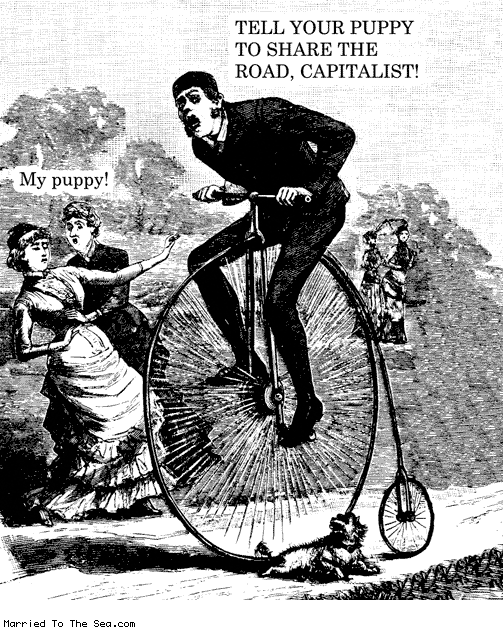
Critical Mass, 1885, via Married to the Sea

ENDCAT, Cute Overload
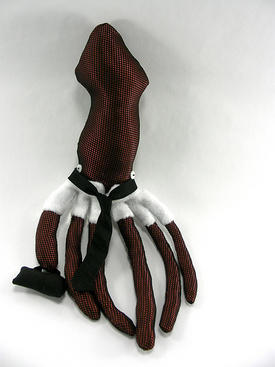
An office worker squid, via Boing Boing
Thursday, June 18, 2009
Theory Thursday--Really Long Apology Addition
To make up for it, today's Theory Thursday will be super long.
News of the Fucked Up
Resist Racism wrote about the terrible fucked-up way we do health care for American Indians (as well as everything else). The news article cites this statistic:
American Indians have disproportionately high death rates from unintentional injuries and suicide, and a high prevalence of risk factors for obesity, substance abuse, sudden infant death syndrome, teenage pregnancy, liver disease and hepatitis.
While campaigning on Indian reservations, presidential candidate Barack Obama cited this statistic: After Haiti, men on the impoverished Pine Ridge and Rosebud Reservations in South Dakota have the lowest life expectancy in the Western Hemisphere."
Weird Texas News
Want an example of male privilege endorsed by the state? Recently in Travis County (that's where Austin, TX is), a police officer tasered a 72-year-old woman because she was "belligerent." Bilerico blogs it here. Here's the video (note: it's really graphic.)
Baby Armadillo, via Cute Overload. Because, you know, armadillos are in Texas. Seriously, there are so many armadillo references in Austin. My water bottle from my local bike shop has an armadillo on it.

Feministe is rounding up their semi-regular Feministe's Next Top Troll. All the comments are pretty hilariously ridiculous, and are very indicative of Foucault's ideas of pre-modern punishment--flagrantly display the punished for all to laugh at and consume.
This connects to my last comments about fucking up, and what it means, and also what it means to just not understand trans issues. sexgenderbody wrote a post about how Trans ignorance isn't trans phobia, and Queen Emily over at Questioning Transphobia responsed that ignorance is pretty much the core of trans phobia. She notes:
it is about having the power not to know and not to care..
and we simply can’t afford to be naive
enough to think otherwise."
There's going to be a Stonewall Anniversary Weekend in Atlanta, and Caitlin Childs will be at a reading for Femmethology in celebration. Here's more info:
queerradical raises the important question: Should you sleep with people who don't share your politics? Sounds like a young adult novel worth writing.
Thursday Theory Recipes
OMG Cheese Straws. This is Deb's photo.


Do you know the word for "to loathe to the point of nausea"? (Oft applicable for many issues). The word is wlate.
Whenever you go to the New York Times website, you can look up a word by highlighting it. Here are the 50 most looked up words, via Word Journal.
France has chocolate scented stamps. That is seriously a good idea.
All right, y'all. Have a good week.
Friday, June 5, 2009
Theory Thursday Links and Pictures
Harvard endowed a chair for "gay studies" (emphasis on that it's called gay studies, for crying out loud--that's so 1992). Harvard is saying it's the first school to endow such a chair, but whatever Harvard--the University of Louisville has had the Audre Lorde endowed chair in Race, Class, Gender, and Sexuality for four years now. I guess that if it's not about white gay men then it doesn't count as the "first" endowed chair about sexuality.
This doesn't have much to do with theory, but the World Beard Championship was about two weeks ago, and there were some awesome beards.

The photo is from Kempt.
Both cripchick and Wheelchair Dancer (in response to Brown Femi Power's post about What is Butch?) took on the butch/femme dichotomy a few days ago and discussed how disability interacts with gender. Well, not just interacts with gender, but completely reshapes it, and also how ideas about gender and gender theory are rather whitewashed and portrayed as able-bodied.
I've been thinking a lot about fucking up lately--what exactly does it mean to "fuck up," particularly in the context of being someone with a privileged identity fucking up and being oppressive around folks with marginalized identities. It's really complicated, and I think that for me, being a trans person that people don't think is trans, fucking up around me is super complicated. I'm thinking particularly of the time (there are of course, countless other times) I met someone's new boyfriend, who in all other respects was a great guy, really funny, and extremely respectful of my friend. But at one point in the night, "tranny heels" passed from his lips in regards to someone's particularly high shoes. I didn't say anything to him, and I always regret it, because I think standing up for not just myself but other trans people would have been really good. But what does it boil down to to call people out? And why do we fear being called out when we say something stupid or wrong or oppressive?
This is a really interesting juncture of theory and praxis, I believe--here are these instances, these missteps, that remind us of oppression when we've forgotten about it for a moment, and then we have our own instances and missteps where we choose to say things or not say things. I'm being rambly, but that's because I'm thinking through it. Part of what I want to write more about this summer is when theory fucks up--for instance, when Judith Butler uses women of color to prove her point that "woman" as the subject of feminism is too universal, but then just drops any other analysis of race after she's used the theories and bodies of women of color to prove her fucking point. That's some theory fucking up. So it is too when Foucault sort of forgets about women in his whole History of Sexuality and all. How do we address fucked up theory? How do we interact with it, still use it, write about it, and not be fucked up ourselves? Is there any way around it?
Anyways, BFP wrote a post contextualizing fucking up. Talking about a clinic where some terrible stuff happened, BFP wrote:
for women of color centering the lives of women in the worst part of the city–this is what happens when they “fuck up.” the women that need the most help are brutally murdered, and twenty years later, the guilt, the violence, the regret, the horror is still with those who were trying to help. this is learning the hard way what works and what doesn’t. this is learning the hard way what “movement” really means. this is courage, massive huge radical fucking courage: because that clinic didn’t fold under the guilt, the violence, the regret, the horror. Twenty years later, it is still centering women, fighting for women, believing in women with every fiber it has. A whole lot wiser–after a whole fucking world of mistakes.
doesn’t being called “a racist” or being told “that is racist” (or any other thing out there), seem a lot less horrifying now?
See you soon, y'all. I don't think I can say much more after that.
Thursday, May 28, 2009
Thursday Theory Links and Pictures
Too many transpeople rely on the advice of cisgender specialists to guide them - therapists, doctors, psychiatrists all operating from various different interpretations of a transphobic text. Assisting each other to transition keeps our communities more united - and ensures at least the majority of advice is correct.
So yeah. It's great! I'm currently grappling, theoretically and personally, with what it means to be trans, and how trans people work the system of cisgender medicalization and still make it out okay at the end of the day. Dean Spade has a great essay about grappling with how cisgender folks are gatekeepers for trans bodies called "Mutilating Gender". Check it out here.
Second, over at Pam's House Blend, Autumn brings to light something quite political, personal, and physical about the sex/gender divide that many folks (including Judith Butler) define. Specifically, as she highlights from a Homeland Security update:
The second phase of Secure Flight begins August 15, 2009, when passengers will be required to enter their date of birth and gender when booking airline flights. TSA said the additional data will help prevent the misidentification of passengers who have similar names to individuals on the watch list, and better identify individuals that may pose a known or suspected threat.
That sucks a lot for trans people, many of whom have different names and different sexes on different goverment documents. So yeah, sex is socially constructed, if you didn't know, and it's not a clear cut divide, and it's often used as a tool to fuck trans folks over.
Third, over at queerradical.com, 7 Dirty Tidbits about Louis Althusser. Are you
a hipster Marxist?
Finally, (this one is old) The Guardian determines that the
ultimate postmodern novel is actually a film.
Thursday, May 21, 2009
Thursday Theory Links and Pictures

LolFoucault, Panopticon division
via tn_jackrabbit at LOLTHEORISTS lj group
![[Michelle+A+.+ow+.+thank+you+stacey+result.jpg]](https://blogger.googleusercontent.com/img/b/R29vZ2xl/AVvXsEjoxJvG2njNON6d-LUd6OppDa-O4mGrIWOeKnBU2qNIxWUZ19aeFEfO181nwQuP0jb-wA4gE8BlpzW_0ekLzOnCSNcYcSzu7SxM0zx6DJZrSQLyxG_MygWnpDvW-hbT93UY74IAKKtpMus/s1600/Michelle+A+.+ow+.+thank+you+stacey+result.jpg)
Signifer/Signified? And the importance of underpunctuation
over at Cake Wrecks!
In Austin they recently held the 32nd annual O. Henry pun-off.
In Canonball news, I'm starting History of Sexuality, Vol. 1 today for my senior thesis, so you'll get to go along with me on that trip. I'll keep you updated; I'll also be summarizing and critiquing some Foucault introduction books.
Oh, and thanks for everyone who stuck up for me at Feministing.
Subscribe to canonball
Tags
Blog Archive
-
▼
2009
(42)
-
►
July
(17)
- Tattooed Ladies of the TLA
- This Morning
- Below the Belt Raises the Question: Will you be a...
- Alas the shoes dost no fit thy dainty feet!
- Homeland is Where the Heartland Is.
- Hooray!
- Frisco
- TINY HORSE ALERT
- The Day after Theory Thursday Links and Opinions
- Tip: Don't Invade Gay Bars on the Anniversary of ...
- And Tango Makes Biased People Uncomfortable
- Maddow vs. Buchanan
- Thursday Theory: The Jumbled Up Edition
- Dear American Library Association
- Sotomayor, Cats, and Stuff
- Some Quotes about the Word Cisgender
- another social construction example
-
►
July
(17)
About Me
- canonball
- I'm a young trans person living between two states, trying to make ends meet, both intellectually and monetarily.




